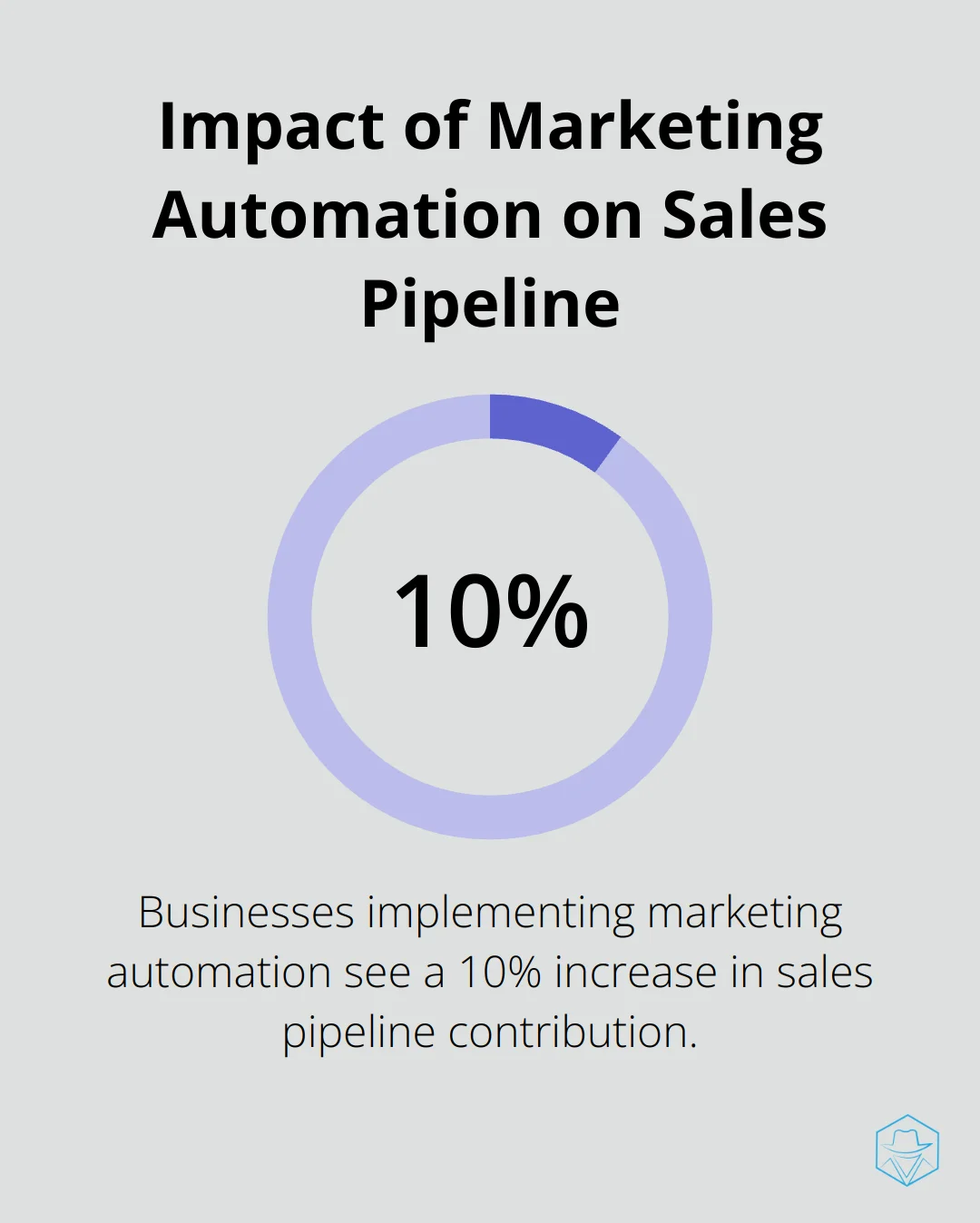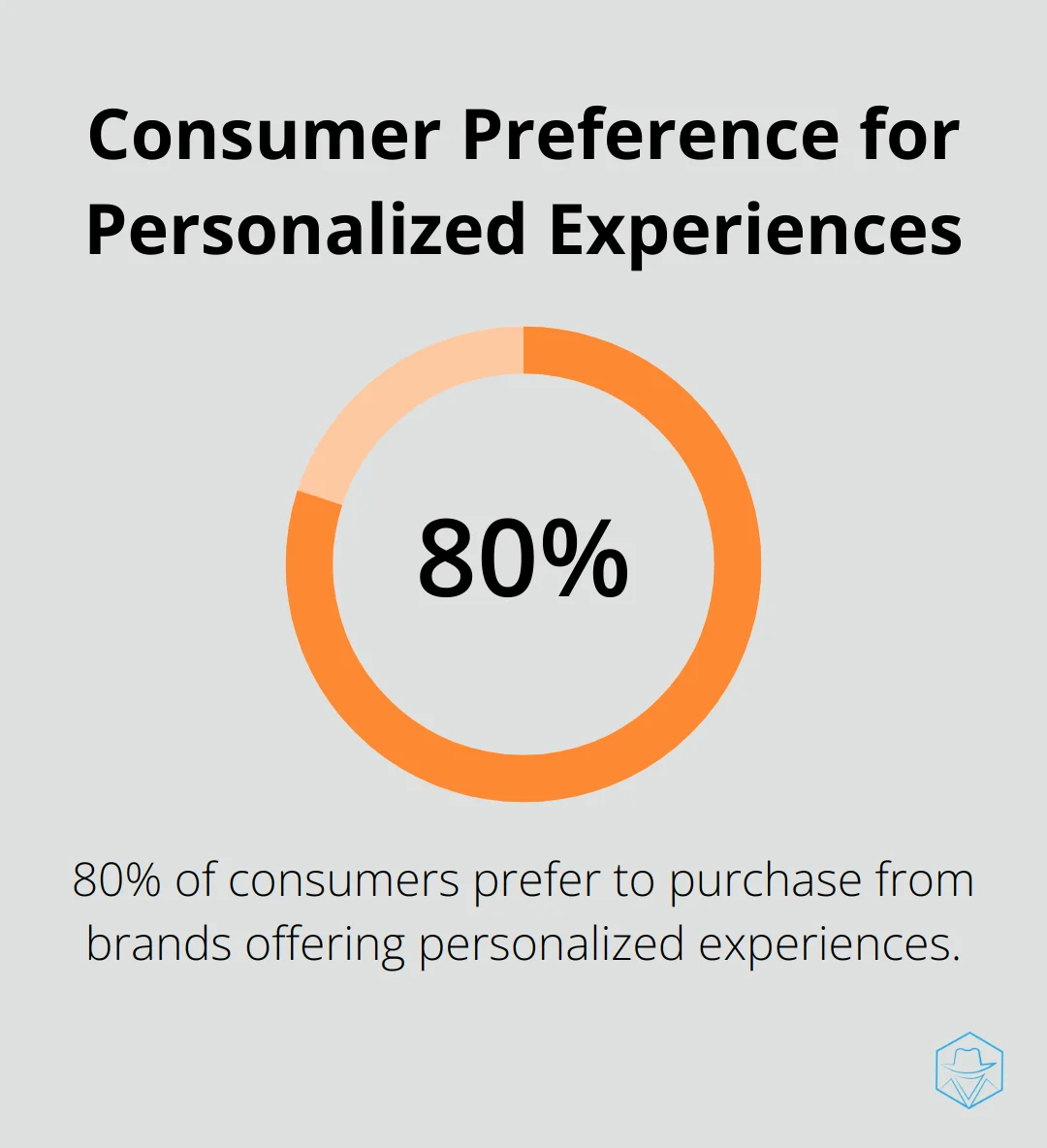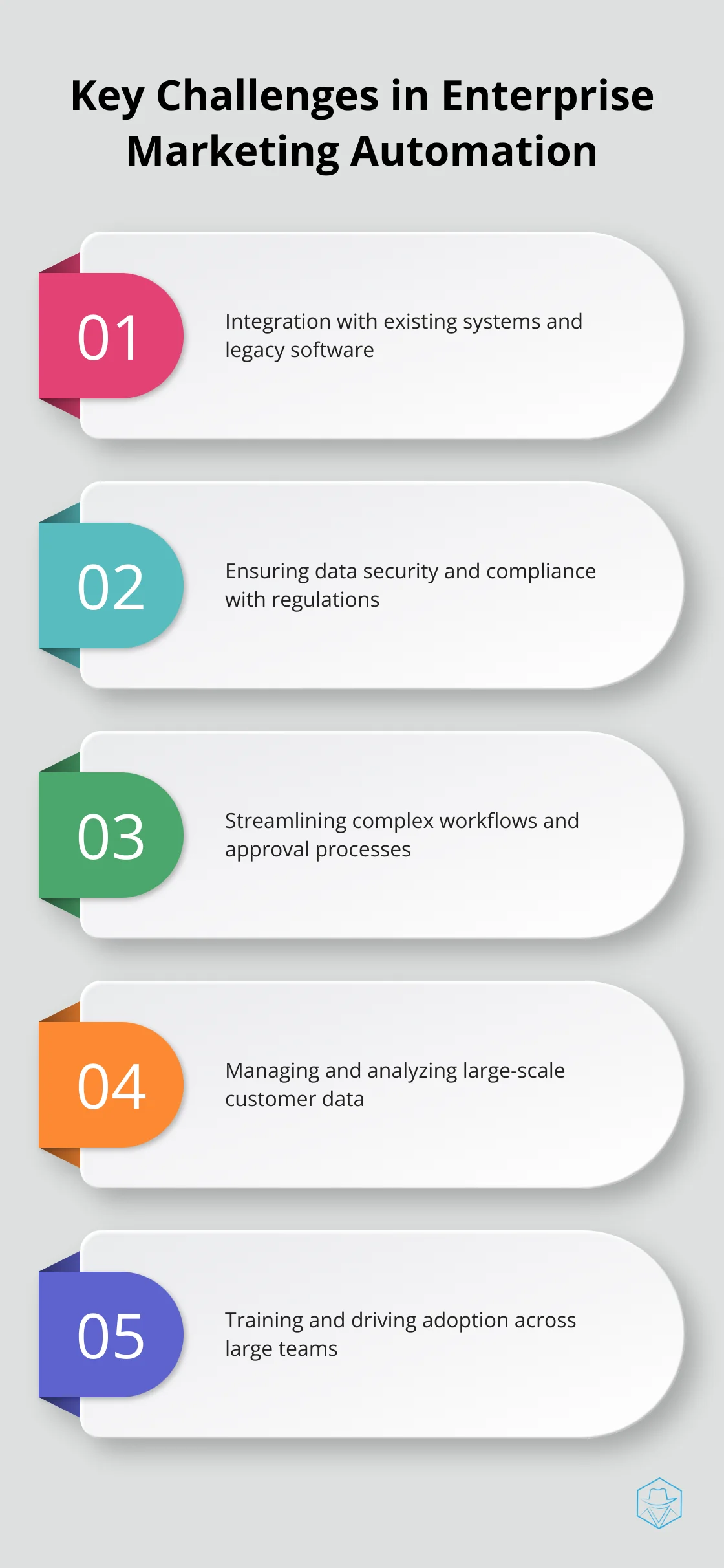Enterprise Marketing Automation: Scaling Your Efforts

At Drop Cowboy, we’ve seen firsthand how marketing automation can transform enterprise-level businesses.
Marketing automation for enterprises is no longer a luxury-it’s a necessity for staying competitive in today’s fast-paced digital landscape.
In this post, we’ll explore how large organizations can scale their marketing efforts through automation, overcome common challenges, and drive significant results.
What Is Enterprise Marketing Automation?
Enterprise marketing automation revolutionizes large-scale businesses. It uses software to streamline and automate marketing tasks and workflows. For enterprise-level organizations, it extends beyond simple email scheduling or social media posting.
The Power of Automation at Scale
Enterprise marketing automation manages complex, multi-channel campaigns across vast customer bases. It transforms the process from sending a few hundred emails to orchestrating personalized communications to millions of customers across various touchpoints.
A Forrester study reveals that businesses implementing marketing automation experience a 10% increase in their sales pipeline contribution. This statistic highlights the significant impact automation can have on an enterprise’s bottom line.

Key Components of Enterprise-Level Automation
Effective enterprise marketing automation strategies typically include several critical components:
- Customer Relationship Management (CRM) Integration: This allows for seamless data flow between marketing and sales teams.
- Advanced Segmentation: Enterprises can create highly specific customer segments based on behavior, demographics, and engagement levels.
- Multi-Channel Campaign Management: Automation makes coordinating messaging across email, social media, SMS, and other channels manageable.
- Predictive Analytics: AI-powered tools can forecast customer behavior and optimize marketing strategies accordingly.
Unique Challenges for Enterprise Automation
Enterprise-level businesses face unique challenges when implementing marketing automation. These often include:
- Data Volume: Enterprises deal with massive amounts of customer data. Automation systems must handle this volume without compromising performance.
- Complex Approval Processes: Large organizations often involve multiple stakeholders in marketing decisions. Automation needs to accommodate these approval workflows.
- Legacy System Integration: Many enterprises have existing systems that need integration with new automation tools (a complex and time-consuming process).
The Role of SMS and Voicemail in Enterprise Automation
SMS and voicemail campaigns play a significant role in enterprise marketing automation. These channels offer direct, personal communication with customers. Platforms that handle large-scale SMS and voicemail campaigns (like Drop Cowboy) can significantly enhance an enterprise’s marketing automation strategy.
The next chapter will explore specific strategies and tools that make scaling marketing efforts through automation possible for enterprise-level businesses.
How Enterprises Scale Marketing Efforts
Personalization at Scale: The Game-Changer
Personalization transforms marketing for large-scale businesses. A study by Epsilon reveals that 80% of consumers prefer to purchase from brands offering personalized experiences. Enterprise-level automation tools enable marketers to create specific customer segments based on behavior, demographics, and engagement levels. These segments receive tailored content that addresses their unique needs and interests.

For instance, a global retailer might use automation to send personalized product recommendations based on past purchases, browsing history, and location. This level of personalization (when implemented at scale) can significantly boost conversion rates and customer loyalty.
Mastering Multi-Channel Campaign Management
Modern customers interact with brands across multiple touchpoints. Effective enterprise marketing requires a cohesive strategy across all these channels. Automation makes this possible.
The right tools allow marketers to coordinate messaging across email, social media, SMS, and even ringless voicemail. This ensures a consistent brand voice and experience, regardless of where the customer encounters the message.
A study by Omnisend found that marketing campaigns using three or more channels earned a 287% higher purchase rate than single-channel campaigns. This underscores the importance of a well-coordinated, multi-channel approach.
Nurturing Leads in a Sea of Prospects
For enterprise-level businesses dealing with vast customer bases, lead scoring and nurturing become critical. Automation allows for the creation of sophisticated lead scoring models that consider multiple factors like engagement level, demographic information, and behavior patterns.
Once leads receive scores, automated nurturing campaigns trigger based on specific criteria. This ensures that potential customers receive relevant information at the right time in their buyer’s journey, increasing the likelihood of conversion.
Data-Driven Decision Making
Advanced analytics and reporting capabilities allow marketers to track campaign performance in real-time, understand customer behavior patterns, and measure ROI across different channels and initiatives.
This data-driven approach enables continuous optimization. Marketers can quickly identify effective strategies and make rapid adjustments to tactics.
A report by McKinsey found that companies using data-driven personalization delivered five to eight times the ROI on marketing spend and lifted sales by 10% or more. This highlights the transformative power of data-driven marketing enabled by automation.
The Role of AI in Enterprise Marketing Automation
Artificial Intelligence (AI) plays an increasingly important role in enterprise marketing automation. AI-powered tools can predict customer behavior, optimize content delivery, and even generate personalized content at scale.
For example, Drop Cowboy’s Mimic AI™ technology allows users to clone their voice for personalized messages, significantly increasing engagement rates. This type of AI-driven personalization represents the cutting edge of enterprise marketing automation.
As we move forward, we’ll explore how enterprises can overcome specific challenges when implementing these powerful automation strategies.
Navigating Enterprise Automation Hurdles
Integration: The Foundation of Success
Enterprise-level marketing automation requires seamless integration with existing systems. Legacy software often forms the backbone of enterprise operations, making integration a top priority.
To address this challenge, companies should conduct a thorough audit of their current tech stack. This audit will identify which systems need to interface with the new automation platform. The next step involves selecting automation solutions that offer robust APIs and pre-built integrations with popular enterprise software.
Integration is an ongoing process (not a one-time task). Companies must plan for continuous maintenance and updates to keep systems synchronized as both automation platforms and legacy systems evolve.

Data Security and Compliance: A Top Priority
Enterprises handle vast amounts of sensitive customer information, which makes data security and compliance critical concerns. The selection of an automation platform should prioritize strong security credentials. Key features to look for include end-to-end encryption, regular security audits, and compliance with industry standards (such as GDPR and CCPA).
Companies should implement regular security training for their teams. Even the most secure system can be compromised by human error, so it’s essential that all team members understand the importance of data protection and follow best practices.
Streamlining Complex Workflows
Enterprise marketing often involves intricate approval processes and workflows. Automation needs to accommodate these complexities without creating bottlenecks.
The first step is to map out current workflows in detail. This mapping will help identify areas where automation can streamline processes without sacrificing necessary oversight. Companies should look for automation platforms that offer flexible workflow builders.
A phased approach to automation often yields the best results. Companies can start with simpler workflows and gradually automate more complex processes as their team becomes more comfortable with the system.
Managing Large-Scale Data
Enterprises deal with massive amounts of customer data. Automation systems must handle this volume without compromising performance.
To address this challenge, companies should invest in robust data management systems. These systems should be capable of processing and analyzing large datasets quickly and efficiently. Additionally, companies should implement data cleansing and validation processes to ensure the quality of their data.
Training and Adoption Across Large Teams
Implementing new automation tools across large teams can be challenging. To ensure successful adoption, companies should develop comprehensive training programs. These programs should cover not only the technical aspects of the new tools but also the strategic benefits of automation.
Creating a team of “automation champions” within the organization can help drive adoption. These champions can provide peer-to-peer support and share best practices across different departments.
Final Thoughts
Enterprise marketing automation has become essential for large-scale businesses in today’s digital landscape. Companies that implement marketing automation experience substantial improvements in their sales pipeline and overall marketing performance. Advanced automation technologies enable personalization at scale, complex multi-channel campaign management, and data-driven decision-making that drive significant results.
The future of marketing automation enterprise solutions promises continued advancements in AI and machine learning capabilities. These advancements will enable more sophisticated predictive analytics and personalization. Integration between marketing automation platforms and other business systems will become more seamless, allowing for a holistic approach to customer engagement.
Drop Cowboy offers innovative solutions like Mimic AI™ for voice cloning and ringless voicemail, which enable personalized, high-impact campaigns at scale. Our advanced communication platform can significantly enhance customer engagement and drive better results. We encourage you to integrate these powerful tools into your marketing automation strategy and watch your enterprise-level marketing efforts soar to new heights.
blog-dropcowboy-com
Related posts

March 30, 2025
How to Use HubSpot for Business Growth
Discover what HubSpot is used for to boost business growth with proven strategies and tools for efficient marketing, sales, and customer service solutions.

May 8, 2025
Inbound Marketing Automation: Drive Organic Growth
Boost organic growth with inbound marketing automation tips, strategies, and tools. Enhance customer engagement and streamline your marketing efforts today!

March 4, 2025
Understanding Text Marketing Laws and Regulations
Navigate text marketing laws effectively. Learn essential guidelines, ensure compliance, and protect your business while communicating through texts.

August 22, 2025
Revolutionize Your Outreach with AI Voice Synthesis Technology
Transform outreach efforts with AI voice synthesis. Explore practical tips and trends, boosting engagement with innovative technology solutions.

April 8, 2025
Best Marketing Automation Courses for Professionals
Explore top marketing automation courses for professionals and elevate your skills with essential tools and strategies for success.

May 27, 2025
Shogun for Shopify: Boost Your Store’s Performance
Boost sales with Shogun for Shopify. Enhance store performance and user experience today. Learn practical tips for seamless integration.